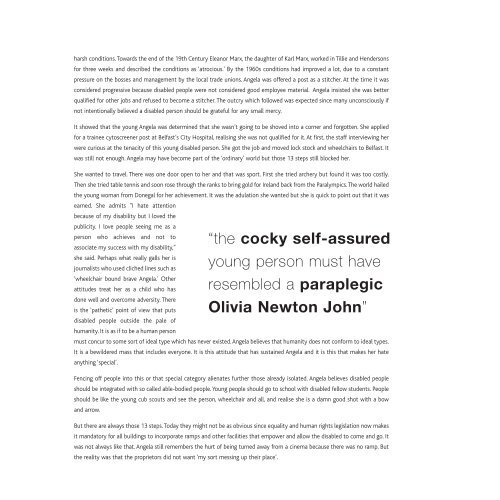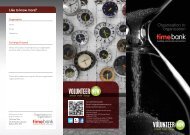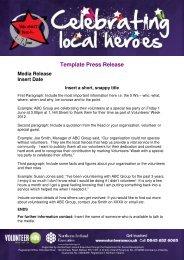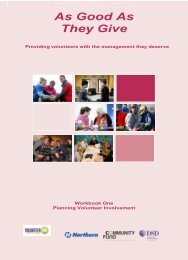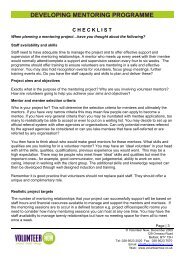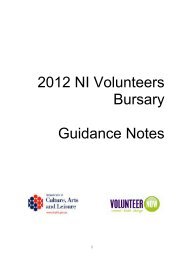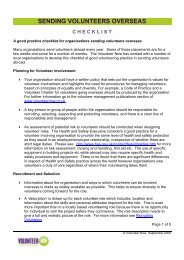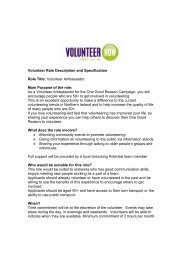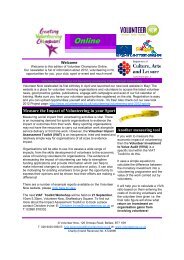Stories from the Edge - Volunteer Now
Stories from the Edge - Volunteer Now
Stories from the Edge - Volunteer Now
You also want an ePaper? Increase the reach of your titles
YUMPU automatically turns print PDFs into web optimized ePapers that Google loves.
harsh conditions. Towards <strong>the</strong> end of <strong>the</strong> 19th Century Eleanor Marx, <strong>the</strong> daughter of Karl Marx, worked in Tillie and Hendersonsfor three weeks and described <strong>the</strong> conditions as ‘atrocious.’ By <strong>the</strong> 1960s conditions had improved a lot, due to a constantpressure on <strong>the</strong> bosses and management by <strong>the</strong> local trade unions. Angela was offered a post as a stitcher. At <strong>the</strong> time it wasconsidered progressive because disabled people were not considered good employee material. Angela insisted she was betterqualified for o<strong>the</strong>r jobs and refused to become a stitcher. The outcry which followed was expected since many unconsciously ifnot intentionally believed a disabled person should be grateful for any small mercy.It showed that <strong>the</strong> young Angela was determined that she wasn’t going to be shoved into a corner and forgotten. She appliedfor a trainee cytoscreener post at Belfast’s City Hospital, realising she was not qualified for it. At first, <strong>the</strong> staff interviewing herwere curious at <strong>the</strong> tenacity of this young disabled person. She got <strong>the</strong> job and moved lock stock and wheelchairs to Belfast. Itwas still not enough. Angela may have become part of <strong>the</strong> ‘ordinary’ world but those 13 steps still blocked her.She wanted to travel. There was one door open to her and that was sport. First she tried archery but found it was too costly.Then she tried table tennis and soon rose through <strong>the</strong> ranks to bring gold for Ireland back <strong>from</strong> <strong>the</strong> Paralympics.The world hailed<strong>the</strong> young woman <strong>from</strong> Donegal for her achievement. It was <strong>the</strong> adulation she wanted but she is quick to point out that it wasearned. She admits "I hate attentionbecause of my disability but I loved <strong>the</strong>publicity. I love people seeing me as aperson who achieves and not toassociate my success with my disability,”she said. Perhaps what really galls her isjournalists who used cliched lines such as‘wheelchair bound brave Angela.’ O<strong>the</strong>rattitudes treat her as a child who hasdone well and overcome adversity. Thereis <strong>the</strong> ‘pa<strong>the</strong>tic’ point of view that putsdisabled people outside <strong>the</strong> pale ofhumanity. It is as if to be a human person“<strong>the</strong> cocky self-assuredyoung person must haveresembled a paraplegicOlivia Newton John”must concur to some sort of ideal type which has never existed. Angela believes that humanity does not conform to ideal types.It is a bewildered mass that includes everyone. It is this attitude that has sustained Angela and it is this that makes her hateanything ‘special’.Fencing off people into this or that special category alienates fur<strong>the</strong>r those already isolated. Angela believes disabled peopleshould be integrated with so called able-bodied people. Young people should go to school with disabled fellow students. Peopleshould be like <strong>the</strong> young cub scouts and see <strong>the</strong> person, wheelchair and all, and realise she is a damn good shot with a bowand arrow.But <strong>the</strong>re are always those 13 steps. Today <strong>the</strong>y might not be as obvious since equality and human rights legislation now makesit mandatory for all buildings to incorporate ramps and o<strong>the</strong>r facilities that empower and allow <strong>the</strong> disabled to come and go. Itwas not always like that. Angela still remembers <strong>the</strong> hurt of being turned away <strong>from</strong> a cinema because <strong>the</strong>re was no ramp. But<strong>the</strong> reality was that <strong>the</strong> proprietors did not want ‘my sort messing up <strong>the</strong>ir place’.


